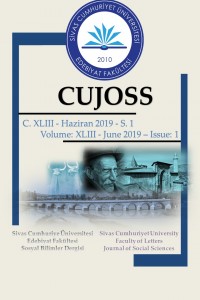Öz
The purpose of this study was to investigate whether
spousal support, highly correlated with marital satisfaction, is affected by
the number of kids and other factors as they are the most important issues in a
marriage. Findings are expected to benefit spouses for family planning
regarding the number of children. In today’s society, marital satisfaction and
spousal support are accepted the most important issues. Marital satisfaction is
basically defined as the satisfaction that the couples get from marriage on a
personal and environmental basis. Spousal support is accepted as the support
they provide to each other. Recent studies showed that a positive correlation
exists between spousal support and marital satisfaction. However, there are a
few types of research on issues regarding their foundations. The study group
consisted of 201 married in Kayseri province in Turkey. The Marriage
Satisfaction Scale (MSS), the Spouse Support Scale (SSS) and a Demographic Form
were utilized for data collection. Data analysis was conducted with statistical
analysis including average scores, standard deviations, and Pearson
correlation. The findings showed that a negative medium correlation existed for
the participants with no kids and with four children compared to marital
satisfaction and marital support levels. In addition, the higher the number of
children, the higher the negative correlation between marital satisfaction and
support was found. In conclusion, the number of children and other factors
significantly affects spousal support and marital satisfaction.
Anahtar Kelimeler
Marital satisfaction; spousal support; the number of children.
Kaynakça
- Beach, S. R., Arias, I., & O'leary, K.D. (1986). The relationship of marital satisfaction and social support to depressive symptomatology. Journal of Psychopathology and Behavioral Assessment, 8(4), 305-316. Brubaker, T. H. & Kimberly, J.A. (1993). Challenges to the American Family. (Eds. T. H. Brubaker’s) Family relations: Challenges for the future (pp. 3-16). Newbury Park, CA: Sage. Cutrona, C. E. & Suhr, J. A. (1994). Social support communication in the context of marriage: An analysis of couples’ supportive interactions. In B. R. Burleson, T. L. Albrecht & I. G. Sarason (Eds.), Communication of social support: Messages, interactions, relationships, and community (pp. 113-135). Thousand Oaks, CA: Sage. Cag, P. & Yildirim, İ. (2013). Relational and personal predictors of marital satisfaction. Journal of Turkish psychological counseling and guidance, 4(39), 13-23. Cinar, L.(2008). Evlilik doyumu: Cinsiyet rolleri ve yardım arama tutumu. Master thesis, Gazi University, Social Science Institute, Ankara. Celik, M. (2006). Evlilik doyum ölçeği geliştirme çalışması. Doctoral dissertation, Cukurova University, Social Science Institute, Adana. Dehle, C., Larsen, D. & Landers, J. E. (2001). Social support in marriage. The American Journal of Family Therapy, 29, 307-324. Gadassi, R., Bar-Nahum, L. E., Newhouse, S., Anderson, R., Heiman, J. R., RAFAELI, E., & JANSSEN, E. (2016). Perceived partner responsiveness mediates the association between sexual and marital satisfaction: A daily diary study in newlywed couples. Archives of Sexual Behavior, 45(1), 109-120. Jiang, H., Wang, L., Zhang, Q., Liu, D. X., Ding, J., Lei, Z., & Pan, F. (2015). Family functioning, marital satisfaction and social support in hemodialysis patients and their spouses. Stress and Health, 31(2), 166-174. Kabasakal, Z., & Soylu, Y. (2016). An investigation of married individuals’ marital satisfaction related to gender and spousal support. Journal of Research in Education and Teaching, 5(4), 208-214. Larson, J. H. & Holman, T. B. (1994). Predictors of marital quality and stability. Family Relations, 43, 228-237. Mickelson, K. D., Claffey, S. T., & Williams, S. L. (2006). The moderating role of gender and gender role attitudes on the link between spousal support and marital quality. Sex Roles, 55(1-2), 73-82. Neff, L. A. & Karney, B. R. (2005). Gender differences in social support: A question of skill or responsiveness? Journal of Personality and Social Psychology, 88(1), 79–90. Ozguven, I. E. (2000). Evlilik ve aile terapisi (Marriage and family therapy). Ankara: PDREM publishing. Polenick, C. A., Zarit, S. H., Birditt, K. S., Bangerter, L. R., Seidel, A. J., & Fingerman, K. L. (2017). Intergenerational support and marital satisfaction: Implications of beliefs about helping aging parents. Journal of Marriage and Family, 79(1), 131-146. Schiaffino, K. M. & Revenson T. A. (1995). Relative contributions of spousal support and illness appraisals to depressed mood in arthritis patients. Arthritis Care Res., 8, 80–87. Sokolski, D.M. & Hendrick, S.S. (1999). Marital satisfaction. American Journal of Family Therapy, 26(1), 39-49. Tezer, E. (1986). Evli eşler arasındaki çatışma davranışları: algılama ve doyum. Doctoral dissertation, Hacettepe University, Ankara. Yildirim, I. (2004). Development of spousal support inventory. Journal of Turkish Psychological Counseling and Guidance, 3(22), 19-25. Wan, C. K., Jaccard, J., & Ramey, S. L. (1996). The relationship between social support and life satisfaction as a function of family structure. Journal of Marriage and the Family, 58(2), 502-513.
Ayrıntılar
| Birincil Dil | İngilizce |
|---|---|
| Bölüm | Articles |
| Yazarlar | |
| Yayımlanma Tarihi | 25 Haziran 2019 |
| Yayımlandığı Sayı | Yıl 2019 Cilt: 43 Sayı: 1 |

Bu eser Creative Commons Atıf-GayriTicari 4.0 Uluslararası Lisansı ile lisanslanmıştır.

